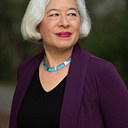Bridging the Abortion Divide

How are you feeling in response to the Supreme Court’s decision to overturn Roe v. Wade? Are you devastated, delighted, or somewhere in between? Are you celebrating, or are you protesting? Are you hopeful or concerned about the future of our country? Are you in a community with people who have similar views, or are you feeling isolated in your perspective?
It’s a difficult moment to bridge this divide. Not only might you have strong feelings about abortion; you might have strong feelings about people whose views are different from yours. You might have a clear sense of the morality of your stance and find it easy to identify inconsistencies in the other side’s argument. You might worry that if the other side controls policy decisions, it will harm people. You may feel like you need to protect the most vulnerable from those on the other side of the abortion debate.
The truth is, we often have misperceptions of people whose views differ from ours. Most people’s views are more complex and less extreme than what we see portrayed in the media and social media. One way to correct our biases is through dialogue — conversations motivated by a genuine interest in understanding another point of view.
If you’re willing to give it a try, these resources can offer helpful guidance and examples of dialogue about abortion:
- Pro-Dialogue: Some Benefits of Deepening Our Conversations About Abortion identifies benefits of having deeper conversations about abortion.
- This conversation guide can help structure a discussion about abortion (from Living Room Conversations).
- Here is an example of a constructive public debate about abortion (from Braver Angels).
- This podcast episode demonstrates people with similar viewpoints having a deeper conversation about abortion (from Of Course I’m Not OK).
Fortunately, Americans have a lot of common ground about abortion. Dialogue can help us to move our shared interests forward. Even where we disagree about abortion, we may be able to appreciate the humanity and complexity of those who hold a different view.
Tania Israel is a Professor of Counseling Psychology at the University of California, Santa Barbara and award-winning author of Beyond Your Bubble: How to Connect Across the Political Divide, Skills and Strategies for Conversations That Work (APA, 2020).
